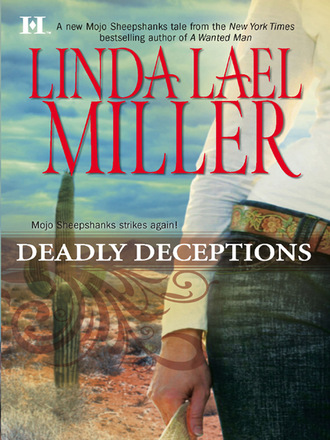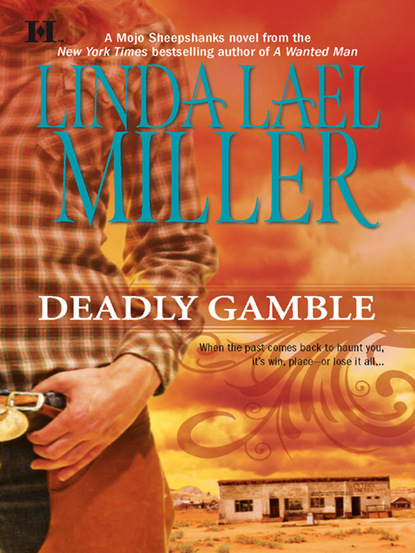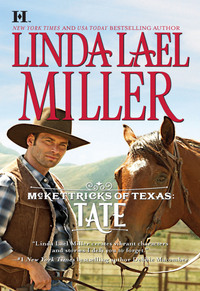
Полная версия
A Mojo Sheepshanks Novel
Tucker followed me through the living room.
I felt a pang, missing Russell, a very alive basset hound, and my equally dead cat, Chester. Russell was in Witness Protection with his people, and Chester, after haunting me for a while, had gone on to the great beyond. Now he only haunted my memory.
My throat tightened as I grabbed the carafe off the coffeemaker, rinsed it at the sink and began the brewing process. I heard Tucker drag back a chair at the table behind me and sink into it.
“You’ve seen her again,” he said. “Gillian, I mean.”
I nodded without looking back at him. I couldn’t, just then, because my eyes were burning with tears. “She was at the funeral.”
Tucker didn’t throw a net over me, for my own safety and that of others, or anything like that. He was the most rational man I’d ever known, and his brain was heavily weighted to the left, but as a child, he’d had an experience with a ghost himself. He’d believed me when I told him about seeing Nick, and Gillian, too.
I don’t know what I would have done if he hadn’t.
“She doesn’t talk, Tuck,” I said, groping to assemble the coffee. Open the can, spoon in ground java beans.
“She wouldn’t,” Tucker answered. “She was a deaf-mute.”
I turned, staring at him, forgetting all about my wet eyes. He got up, took the carafe from my hands, poured the water into the top of the coffeemaker and pushed the button.
“I guess that shoots the theory that people leave their disabilities behind when they die,” he said when I couldn’t get a word out of my mouth.
“There’s apparently some kind of transition phase for some people,” I replied when I was sure my voice box hadn’t seized and rusted. “In between death and whatever comes next, that is.” I paused, moved away from him to get two mugs down off a cupboard shelf and rinse them out with hot water. “Why didn’t you tell me Gillian couldn’t hear or speak?”
Tucker leaned against the counter, his arms folded, the ancient coffeemaker chortling and surging behind him, like a rocket trying to take off but not quite having the momentum. Tilting his head slightly to one side, he answered, “It didn’t come up, Moje. We haven’t talked that much lately.”
“She didn’t see who killed her,” I told him. “God, I hope it was quick—that she didn’t suffer, or have time to be scared.” I finally faced him. “Tucker, was she—was she—she wasn’t—”
“She wasn’t molested,” Tucker said.
Relief swept through me with such force that my knees threatened to give out, and Tucker crossed the room in a couple of strides, took me by the shoulders and lowered me gently into a chair.
“How did she die?” I asked very softly. I didn’t want to know, but at the same time I had to, or I was going to go crazy speculating.
Tucker crouched in front of my chair, holding both my hands in his. The pads of his thumbs felt only too good, chafing the centers of my palms. “You can’t tell anybody, Moje,” he said. “That’s really important.”
I knew that. I’d read The Damn Fool’s Guide to Criminal Investigation. The police always keep certain pertinent details of any crime under wraps, for a lot of reasons, not the least of which is the danger of compromising the case if word gets out before the trial.
“Tell me,” I said.
“Gillian was strangled,” he told me. “With a piece of thin wire.”
I swayed in my chair. “Oh, my God—”
“According to the ME, it happened quickly,” Tucker said, but he looked as though he was thinking the same thing I was.
Not quickly enough.
“You’re sure she ruled out the stepfather?” he asked when I didn’t say anything.
I nodded. “I asked her twice.”
“Moje,” Tucker told me after rising from his haunches and taking a chair near mine, “he has an arrest record. Vince Erland, I mean. Solicitation of a minor—sexual context.”
My stomach roiled. I slapped a hand over my mouth.
Tucker waited.
The coffee perked.
“He’s a pedophile?” I asked, my voice coming out as a croak.
“We’re not sure. The alleged victim was seventeen, and there was some evidence that she encouraged his advances. The charges were dismissed.”
“But still…”
Tucker nodded grimly. “Still,” he agreed.
“Gillian might have been mistaken,” I murmured, “or maybe she simply didn’t want to believe her stepfather, someone she trusted, would hurt her.”
“Nine times out of ten,” Tucker said, “the perp is somebody the victim trusts. Lousy, but true.”
“But it could have been a random attack, right?”
“It could have been, but it probably wasn’t.”
“How can you be so sure?”
Tucker closed his eyes, opened them again. “Vince Erland picked Gillian up after the dance rehearsal. According to him, they stopped off at a supermarket on the way home and Gillian vanished. The report’s on file—but he didn’t call it in until he got back to the trailer. Most people would have been on the horn to 911 the second they realized their child was missing. Why did he wait?”
“I don’t know,” I said, pondering. “I didn’t see this on the news, Tuck. That Mr. Erland was the last person to see Gillian—”
“It’ll be out there soon enough,” Tucker said. “His story is that he’d promised her a dog, and then had to go back on his word because he didn’t have the money. He broke the news at the supermarket. She got mad and took off, and he thought she went home—it’s a hike, but she probably could have done it.”
“But the police don’t believe it. That’s why they’re holding Erland.”
Tucker looked conflicted. He probably knew a lot more about the case than he would admit, and he was deciding how much to tell me. “Partly,” he said. “They’re concerned for his safety, too. When it comes out that he was with Gillian just before she died, especially with his background, a lot of people aren’t going to presume he’s innocent until he’s proven guilty. I don’t need to tell you that emotions run high in situations like this. Some of the vigilante types might not be able to resist the temptation to take the law into their own hands.”
I was still thinking about Gillian. She was a deaf-mute; she couldn’t have cried out for help when she realized she was in trouble. Still, small as she was, she was determined, too. I believed she would have put up a struggle, however futile.
My heart ached, imagining that.
“Where was Mrs. Erland during all this?”
“Working,” Tucker said with a shake of his head.
“No one saw anything? There must have been other shoppers in the store—clerks, passersby on the road…”
Tucker didn’t answer.
“You’re a DEA agent,” I prodded. “How come you know so much about this investigation? Surely it isn’t under federal jurisdiction.”
“I resigned,” he answered. “I’m with the sheriff’s department now—homicide division.”
“And right off the bat you were assigned to this particular case? Isn’t that a conflict of interest, considering that Gillian and Daisy were friends?”
“Cave Creek is a small town,” he reasoned quietly. “Helen Erland grew up here. Anybody who caught the case would have at least a passing acquaintance with the family.”
I got up, because the coffee had finally stopped brewing, and poured a cup for Tucker and one for myself.
“I could help, Tucker,” I said. “With the investigation.”
Tucker’s jawline immediately tightened. “No way,” he replied tersely. “This is serious police work, Mojo. There’s no place in a murder investigation for an amateur with a mail-order P.I. license and a stack of Damn Fool’s Guides on procedure.”
“Gillian came to me,” I pointed out, generously letting the gibe about my credentials pass. “There must be a reason.”
Tucker, about to take a sip of his coffee, set the cup down with a thunk. A muscle bunched in his cheek. “I mean it, Mojo,” he warned. “Stay out of this case.”
“Too late,” I answered. “I’m already in.”
“How do you figure that?”
“You’re the one with the badge,” I admitted, “but I’m the one being haunted by a seven-year-old in a ballerina costume. I think Gillian’s trying to help me figure out who killed her, and I wouldn’t turn my back on her even if I could.”
“Can’t you just tell her to go into the Light, or something? Like that woman on TV?”
I sighed. “I wish it were that easy. Do you think I like having a little girl’s ghost pop up every time I turn around? Gillian’s not going anywhere, including into the Light, until she’s ready.”
Tucker paled under his biker’s tan. Rubbed his palms together and stared as though he could see through my kitchen floor and into the closed bar beneath it.
“It’s okay,” I said.
I wanted to reach out, touch his cheek or his shoulder, but I didn’t dare, because I knew where it would lead. We both needed comfort, and I was pretty sure any physical contact between us would be supercharged by grief and frustration. As much as I would have liked to lose myself in Tucker’s lovemaking for a little while, if I did, I wouldn’t be able to stand it when he went back to Allison.
“What’s okay?” he rasped, understandably convinced that nothing ever could be “okay,” in a world where children are murdered.
“Being relieved that this didn’t happen to Daisy or Danny. It’s a normal human reaction—and it doesn’t mean you don’t care about Gillian.”
He glared at me. “Where did that come from? The Damn Fool’s Guide to Bullshit Psychology?”
I sighed. “Go home, Tucker.”
He did. He got up out of his chair and walked out, without another word or even a backward glance.
I should have been relieved, but I wasn’t.
CHAPTER TWO
EVEN BEFORE Tucker’s arrival I hadn’t wanted to be alone in the apartment. After he was gone, the place seemed to yawn like some dark, uncharted cavern.
I emptied our cups, poured out the fresh coffee and shut off the machine. Then I snatched up my key ring, grabbed a couple of Damn Fool’s Guides off the bookshelves in my living room and boogied for the car.
When I arrived at Greer’s fifteen minutes later, I parked in her brick driveway and, once I’d punched in the combination on the keypad by the back gate, skirted the main house. I simply wasn’t up to seeing my sister just then.
The pool looked inviting as I passed, but the sun was still blazing, even though it was definitely headed west. Later, I promised myself.
The guesthouse, euphemistically called a “casita,” was a three-bedroom, one-story territorial with all the conveniences—including a plasma TV that could be lowered out of the ceiling, a sunken bathtub with jets and a wet bar.
It was also blessedly cool.
I tossed my keys, purse and the stack of Damn Fool’s Guides onto the granite-topped counter separating the kitchen and combination living and dining room, and kicked off my high heels. Like the dress, they were Greer’s, and they pinched my toes.
“Gillian?” I called.
Nothing.
I think I can be forgiven for being a little relieved that she wasn’t around. And of course I knew she’d be back.
I proceeded to the master bath, stripped off the dress, chucked the ruined panty hose, started a lukewarm shower going and stepped naked under the spray. After I’d scrubbed and shampooed, I felt a little better. Wrapped in a towel, I padded back into the bedroom, lay down in the middle of the bed and allowed myself to air-dry.
I must have fallen asleep right away.
When I stirred to semiconsciousness, the room was nearly dark and my right big toe was clamped between two strong, cold fingers.
I choked out a strangled little shriek, wrenched free and shinnied to a sitting position with my back against the intricately carved headboard of the bed. Peering at the shadowy, adult-sized form—this was definitely not Gillian—I scrambled to cover myself with the towel.
“Alex?” I gasped, groping for the lamp on the bedside table. Nick?
I’d been meaning to shop for a gun—Jolie had promised to teach me how to shoot it—but there hadn’t been time. Now I wished I’d bought one.
I flipped the switch, and light spilled into the room.
Greer was standing at the foot of my bed, wearing an oversize terry-cloth bathrobe, her cast bulging beneath one side. “You were expecting my husband?” my sister asked archly, raising one eyebrow.
I swore colorfully, finishing with a more moderate “Damn it, Greer, you scared me half to death!”
“I knocked,” Greer said. “You didn’t answer the door, so I came in. I do own the place, you know.”
“As if you’d ever let me forget it,” I snapped, getting off the bed in my towel toga and stomping into the bathroom to snatch my robe off the hook on the back of the door and yank it on. “You shouldn’t sneak up on people like that, Greer,” I ranted when I came out again. “If I’d gotten around to buying my Glock, you’d be perforated by now. And how come your fingers are so damn cold?”
Greer hadn’t moved. Her blond hair was pulled into a ponytail, askew because she’d done it with one hand—on Greer, even that looked elegant—and her expression was stone serious. “I was digging through the freezer, looking for the tamale pie Carmen made before she left on vacation. When it wasn’t there, I decided you might have nabbed it, so I came out here to find out.”
“You could have just looked in my refrigerator,” I pointed out, feeling only mildly guilty for stealing the tamale pie and dining on it, breakfast, lunch and dinner, until it was nearly gone.
“Why did you think it might be Alex who’d grabbed your toe?” Greer demanded suspiciously. Once she latched on to a subject, she was as tenacious as a pit bull with lockjaw.
“I’m not fooling around with your husband, Greer,” I said. “If you won’t credit me with any more honor than that, at least give me a few points for taste.” I stomped out of the bedroom and through to the kitchen, where I opened the refrigerator door, yanked out the casserole dish with about three bites of tamale pie left in it, congealing under a curling crust of cornmeal topping, and slammed it down on the table.
“You never liked Alex,” Greer accused.
“You’re just figuring that out?” I countered. I took a half-empty bottle of white wine from the fridge next, uncorked it and poured two glasses—one for me and one for Greer. Mine was slightly fuller than hers. Okay, I was guilty of pie-napping, but I’d had a harder day than she had, so I figured it was fair.
Greer poked at the remains of the purloined pie with a beautifully manicured fingertip and made a face. “Yuck,” she said, accepting the wineglass I offered.
I softened a little. “I could send out for a pizza,” I suggested.
Greer took a sip of wine and made another face. “At least you didn’t steal this from me,” she said. “My God, Mojo, how can you drink this stuff? It could double as nail polish remover.”
I was used to my sister’s wine snobbery. Her fruit-of-the-vine arrived in fancy crates, the elegant bottles artfully labeled and cosseted in wood shavings. Mine came from convenience stores and, if I was really feeling swank, supermarket closeout shelves. I usually got the boxed kind, in fact, with the handy-dandy little spigot built right in.
I didn’t stoop to answer Greer’s gibe. I simply opened the freezer compartment on my refrigerator, took out a frozen lasagna, single serving, low cal, low carb and low flavor, and handed it to Greer.
“Am I supposed to eat this?” she asked, raising both her perfectly plucked eyebrows this time.
“Since I only have one other option to suggest,” I replied, “I’d go with eating, yes.”
She blinked. “Do you have to be so nasty?” she asked.
I sighed. Shoved a hand through my hair, which was standing out around my head like the mane of some deranged lion because I’d fallen asleep while it was still wet from my shower. I’d probably need a whip and a chair to tame it. Maybe even a Weed Eater.
“Sorry,” I said. “Bad day.”
Greer slapped the frozen dinner down beside the casserole dish. “I suppose you think mine was wonderful? My life is a mess. Just last week I was accosted by an unknown assailant. My arm was broken. I haven’t heard from my husband—for all I know, he’s lying dead in the desert somewhere—”
“I went to a seven-year-old girl’s funeral today, Greer,” I said. Definitely trump card, but of course I didn’t take any satisfaction in the victory.
“I forgot,” Greer said, deflating. She pulled back a chair and sank into it.
“I wish I could,” I answered.
Greer downed another slug of wine. Squeezed her eyes shut, and shuddered.
A little background on Greer. For one thing, she wasn’t Greer Pennington any more than I was Mary Josephine Mayhugh. My abductor/mother, Lillian, had rescued her from a bus station in Boise when she was thirteen—more like sixteen, though she never admitted it—and unofficially adopted the runaway into our unconventional little family. I’d never known what or whom she’d run away from, but Lillian probably had. She’d have sent Greer back to her folks right away if home had been a good place to be.
Recently Greer had admitted she was being blackmailed, at least to Jolie and me, and she’d hired me to find out if her doctor husband was cheating on her. I’d followed up on a few leads, but with all that had been going on, I definitely hadn’t earned my retainer.
I suspected, of course, that the broken-arm attack was connected to the blackmail, but I couldn’t prove it.
I opened the freezer box, popped the contents into the microwave and pushed the appropriate buttons. While Greer’s supper nuked, I drew back another chair and sat down across from her.
Her eyes swam with tears as she gazed into her wineglass.
“Sooner or later,” I said as gently as I could, given that my nerves were still quivering from the jolt she’d given me by gripping my big toe while I was sound asleep, “you’re going to have to tell me the truth about who you are, Greer.”
She gave an odd little giggle, followed by a hiccup. “Greer,” she repeated. “Do you know where I got that name? Off a late-night movie on TV, starring Greer Garson. It was called Julia Misbehaves, and I almost went with ‘Julia,’ but ‘Greer’ had more pizzazz. I wanted to use Garson, too, but Lillian said that probably wouldn’t fly. So I settled for Greer Stewart.”
Considering how little Greer had told me about herself in all the years I’d known her, this was a revelation. I shouldn’t have felt hurt because she’d obviously confided in Lillian, though probably not to any great extent and with a generous peppering of lies, but I did. Once, Greer and I had been close. Then I’d married Nick and she’d married Alex, and things had changed between us.
I had no clue why.
We’d both been playing parts, of course. And somewhere along the way we’d forgotten our lines.
“Who were you before you were Greer?” I persisted very quietly.
For a moment I actually thought she was going to tell me. Then she shook her head. “I know it sounds corny—like something from the late show—but that person doesn’t exist anymore.”
“Anything more from the blackmailer?” Talk about something from the late show. How often does a question like that come up in normal conversation?
Not that I’d know a normal conversation if I fell over it.
Greer bit her lower lip.
The timer on the microwave dinged.
I got up, pulled out the rubber lasagna and set it down in front of the woman I still thought of as my sister, for all the strange distance that stretched between us. I gave her some silverware and refilled her wineglass.
Tentatively she picked up a fork and jabbed it at the lasagna. I knew she was avoiding my eyes, and I was prepared to wait her out. I’ve got staying power—I once camped in front of a furniture store for three days to get the free couch they were offering as a prize at their grand opening. I was on the news twice, and Lillian, alarmed by the publicity, came and dragged me away fifteen minutes before I would have become the proud owner of an orange velour sectional, complete with built-in plastic cup holders.
Just one of the many reasons I have to be grateful to her.
“Greer?” I prompted.
“Yes,” she said.
“Yes, what?”
“Yes, I’ve heard from the blackmailers—plural.”
“When? What did he—they—say? Was it a letter, a phone call, an e-mail? Black-and-white eight-by-tens of you in some compromising position?”
Greer skewered me with a look. “This lasagna,” she said, “is worse than the wine.” But she kept eating. And she kept drinking, too, though I’d already lost interest in the vino. It did taste like vinegar.
“How am I supposed to help you if you won’t tell me what’s going on?”
“I didn’t hire you because I’m being blackmailed. I hired you to find out if Alex is cheating on me.”
“He is,” I said, silently saying goodbye to the five-thousand-dollar retainer she’d given me, not to mention the other five I would have gotten when I turned in a definitive report. Actually, I was in pretty good financial shape for the first time in my life, because my demon ex-mother-in-law, Margery DeLuca, had forked over the proceeds of a life insurance policy Nick had taken out, in a fit of fiscal responsibility, with me as beneficiary. Still, Greer’s payment represented my first earnings as a private investigator and for me that was meaningful.
Greer stiffened, peering at me over the lasagna and the cheap wine. “Do you have proof?”
“No,” I said.
“Then the case isn’t solved, is it? Maybe now that people aren’t trying to kill you, you can get back to work.” This was a reference to recent misadventures—so recent, in fact, that I still had little gummy bits of duct-tape residue on my wrists and ankles. I’d soaked and scoured, but they just kept appearing, as though they’d been hiding under my skin.
“Greer,” I said.
“What?” She sounded testy. Could have been the leather noodles and the rotgut, but I didn’t think so. Greer had been defensive, to say the least, since she’d stolen Alex Pennington from his first missus, closed down her hard-won interior design business and become the classic trophy wife.
“Talk to me. Who’s blackmailing you, and why? More important, have you changed your mind about telling the police?”
The last time we’d discussed the issue, Greer and Jolie and I, she’d refused to involve Scottsdale’s finest. Apparently whatever she’d done to get herself into this mess was bad enough that she was willing to risk her peace of mind, and maybe even her life, to keep it under wraps.
Suddenly Greer shivered, hugged herself. There was a distinct chill in the air, and I expected Gillian to appear, but she didn’t.
Inwardly, I sighed. If the child didn’t turn up soon, I was going to have to go out looking for her. Yes, she was a ghost—technically. But she was also a little kid, caught between two worlds, scared and alone. She’d witnessed her own funeral, too, and that must have been almost as traumatic as her murder.
“I did something terrible when I was young,” Greer said. “Someone knows.”
“What did you do, Greer?”
“I’m not going to tell you,” she said, pushing back her chair to stand. Turning to flee, she stumbled a little. “I can handle this on my own.”
I went after her. Caught hold of her good arm. “Greer,” I pleaded, “listen to me. Somebody tried to nab you—you’re obviously in real danger. What’s going to happen if Alex pulls the financial plug, and you can’t pay these people off any longer?”
She didn’t answer. Trembling, she shook her head, pulled free and fled.
Some P.I. I was. I had a real way with people.
Disconsolately, I finished Greer’s lasagna and what was left of the tamale pie. I’d barely touched my wine, so I poured it down the drain and went back to the bedroom to get dressed.
Five minutes later, sporting jeans, a tank top and a lightweight denim jacket, I fired up the Volvo and headed out to look for Gillian. It was after nine o’clock by then, and nearly dark.
I headed for the cemetery in north Scottsdale, where I knew Gillian had been buried. The place was fenced, but the gates stood open, so I drove in, considered the layout and parked. There were a few other people around—a couple of groundskeepers, a young man sitting cross-legged beside a tombstone and an old woman in a green polyester pantsuit and sensible shoes, arranging and rearranging flowers in an urn.










